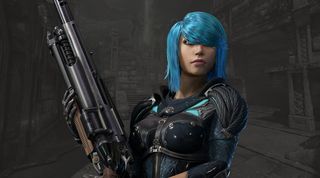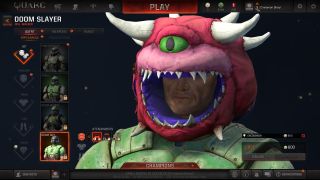What we love and hate about Quake Champions
James and Evan debate the merits of the return of multiplayer Quake.
One month ago, Quake Champions entered Early Access on Steam and Bethesda's platform. Right after launch, id ran the Quake World Championships at QuakeCon, a debut tournament. James and Evan share their thoughts on the somewhat unusual return of the FPS classic.
Evan: James, my feelings for Quake Champions are complex and contradictory.
James: The game I’ve been playing since I can remember has changed, and that’s scary. Character abilities? What?
Evan: You're not the only person grappling with these changes—many Quake fans have been worried about Champions from the moment it was announced at E3 2016. Around that time we ran the headline "Quake Champions is not a MOBA," a clarification that seems hilariously unnecessary today. People were real worried about asymmetrical characters with active abilities diluting the purity of one of the highest-skill multiplayer FPSes ever. Were they right?
James: This is the first Quake with major asymmetries. BJ can temporarily dual-wield, Clutch is slow but has a deployable shield and twice the health as the speedy wall-jumper, Nyx. It’s like someone added a metagame to riding a bike.

Evan: And occasionally, those abilities do rub me the wrong way. I'll be in a rocket duel with someone playing who's Sorlag. We're dueling, dancing at high speed. She's got more HP and armor than me, but also a bigger hitbox, making it easier for me to score direct hits. Then she hits me with with her acid, and I take a bunch of unexpected damage and die. My first five hours in Champions, I was rolling my eyes a lot in those circumstances.
The maps are grim, alien, fun first-person playgrounds for skillful movement.
James: I’m not a big fan of Slash’s exploding trail of death or Scalebearer’s deadly form tackle, but that’s just because they’re unfamiliar. And in time, I might see and react to Sorlag’s acid spit as naturally as a rocket from across the map. Once I’ve internalized those changes, it’s not like I’ll have to worry about team comps or The Meta™ anyway. Form tackle or acid spit or whatever it may be, the special abilities aren’t the team-wipers of Overwatch, and their success still depends on what Quake always has: split-second decision-making and accuracy.
The biggest gaming news, reviews and hardware deals
Keep up to date with the most important stories and the best deals, as picked by the PC Gamer team.
Evan: To me it shows that Quake's ideas are durable enough that Champions' big changes simply dent them, rather than destroy them. This is still one of the fastest-paced FPSes ever made. It's still a game about anticipating your opponent's move to the Quad Damage and using that against them to land a frag. It's still a game about the exhilaration of your hands reacting at a speed that your mind doesn't understand. All that stuff is preserved.
It's also a game about a few very specific traditions of movement: bunnyhopping, strafe jumping, CPMA, crouch sliding. One of the good consequences of all these unique characters is that Champions acts like a living museum of Quake and arena FPS history. If you loved Quake III, play Sorlag or Anarki. If you loved Quake IV (for some reason), play Slash.
James: And it’s this additive vocabulary of movement that makes Quake Champions so deliciously complex. The skill ceiling is plenty high. Now, I have to keep character class, movement speed, and movement abilities from the entire history of Quake in mind for myself and my opponents—all of which still hinge on accuracy and speed, of course. It’s adding unnecessary complexity and asymmetry to a series borne from absolute point-and-click purity, but we’ve been playing pure Quake for decades now. In such a saturated videogame market, I respect that id Software and Saber Interactive have handled it so deftly. I’m not sure Quake Champions is going to dethrone its predecessors, but it’s a fun, surprising iteration worthy of the name for sure.
Evan: How about those cosmetics, though?
James: They are bad. You can unlock cosmetics for your cosmetics. Sub-cosmetics. Some of them look cool, but they’re nearly impossible to recognize at a glance. I understand them as a way to keep Quake Champions free-to-play, they’re just a more awkward fit and implementation than other popular shooters.
Evan: It's an intentionally bloated system—the more stuff there is to unlock, the more time and money you have to spend earning what it is you actually want. Despite this, I still get loads of duplicates in loot crates. There are three currencies. Three tiers of loot boxes. You have to unlock torso, head, and leg pieces for each character, each of which have multiple 'attachments' you can unlock as well.

James: I really want to get the football costume for Ranger. But in order to get it, I have to get 10 lore scrolls. What are lore scrolls? In each multiplayer match, one lore scroll is randomly hidden in a breakable jug. That means that during a match you have to ignore the competition and bust pottery. We’re talking about Quake here, an FPS where you have to be ‘on’ at all times. I’m no designer, but there are so many simpler ways to handle lore scrolls and dole out cool quarterback uniforms.
Evan: The lore scrolls are a truly bizarre fit for Quake, but I think it's even more annoying that you can't buy paint schemes. Not only do you have to hope that you'll get randomly dropped a paint scheme you like, but they're character-specific—if I get 'orange' for Doom Slayer, I still have to unlock 'orange' for every other champ. Come on.
James: Anyway, I’m really enjoying Quake Champions, but my other complaint is how slow the matchmaking is at the moment. I can find a 100-person PUBG in a fifth of the time it takes to find a Champions match at times, and even then, I’m typically thrown into the ring with experts. Most of the people playing right now dropped $30 for the Early Access version, so I’d expect most players are enthusiasts at the moment. Thing is, I was raised on Quake in a safe LAN environment where everyone was near my skill level. Hopefully once it releases into the final free-to-play version, more eternal scrubs like myself will stick around to gleefully shoot one another.
Evan: Despite the microtransaction bullshit, this is one of the better arena FPSes we've had in the last decade. The maps are grim, alien, fun first-person playgrounds for skillful movement. The railgun, lightning gun, and rocket launcher has the same perfect rock-paper-scissors relationship that they did 18 years ago. Champions has also launched in an awfully good state, I think, in terms of hardware performance and features—I love that I can pick which server regions I queue into.
But like you say, James, the higher a multiplayer game's skill ceiling, the more important it becomes for that game to have a wide set of people playing it, so that everyone's able to matchmake with players of similar ability. It'll be interesting to see if Champions can attract that audience when it exits Early Access and goes free.

Evan's a hardcore FPS enthusiast who joined PC Gamer in 2008. After an era spent publishing reviews, news, and cover features, he now oversees editorial operations for PC Gamer worldwide, including setting policy, training, and editing stories written by the wider team. His most-played FPSes are CS:GO, Team Fortress 2, Team Fortress Classic, Rainbow Six Siege, and Arma 2. His first multiplayer FPS was Quake 2, played on serial LAN in his uncle's basement, the ideal conditions for instilling a lifelong fondness for fragging. Evan also leads production of the PC Gaming Show, the annual E3 showcase event dedicated to PC gaming.
Most Popular




